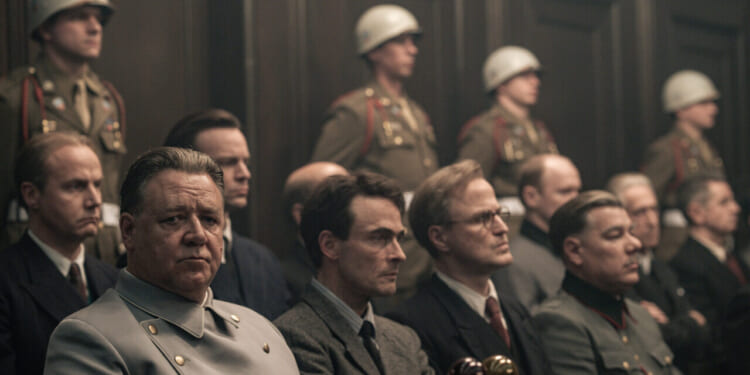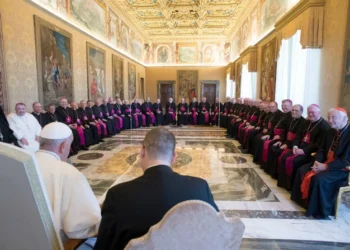There is no doubt that the Russian forces have committed foul play in Ukraine.
“If we can psychologically define evil, we can make sure this never happens again.”
That is how Major Douglas Kelley, played by Rami Malek, explains his efforts to get close to and understand some of the most senior Nazi officials in the movie Nuremberg.
Kelley is particularly interested in cracking Hermann Goering, Hitler’s second-in-command, played by a commanding Russell Crowe.
The movie raises interesting questions about the feasibility of a “Nuremberg moment” to hold accountable Russian high-ranking officials for war crimes committed in Ukraine.
A Modern Day Nuremberg
Could there ever be a Russian Nuremberg?
Despite ample evidence of Russian foul play in Ukraine, it would be difficult to have a “Nuremberg moment” when the war finally ends.
To begin with, it would require a Ukrainian victory. And not just any victory: The Ukrainians would have to prevail to such a degree that they capture senior-ranking military and Kremlin officials. The Allies in Nuremberg were able to put on trial some of the most senior Nazi officials, including Göring, Wilhelm Keitel, Albert Speer, Alfred Jodl, and Karl Dönitz. To be able to do so, they first annihilated Germany, capturing Berlin and leveling many German cities.
Russian War Crimes in Ukraine
On February 24, 2022, Russia launched the full-scale invasion of Ukraine. An invading force numbering almost 200,000 troops rolled into Ukraine from multiple points. The goal was to overthrow the Ukrainian government and install a friendly figure in Kyiv. Russian military and intelligence officers reassured President Vladimir Putin that the “special military operation” would last anywhere from three days to a couple of weeks. They were wrong.
As progress stalled and casualties piled up (Russia has lost approximately 1.2 million men, or six times the initial invasion force), discipline broke down, and several Russian units started committing atrocities against Ukrainian civilians and prisoners of war. According to the Ukrainian government, Russian units have executed at least 124 prisoners of war on the battlefield. Civilians have been tortured and sexually abused. Places like Bucha, a suburb of Kyiv, where a Russian paratrooper unit massacred scores of civilians, became infamous for the war crimes committed in them.
But it is not just individual units that have committed atrocities in Ukraine. Moscow’s long-range fires campaign, for example, intentionally targets Ukrainian urban centers. Strikes often are indiscriminate, resulting in heavy civilian losses, including children and elderly people among them. Moreover, in the occupied territories of Ukraine, the Kremlin has been transferring Ukrainian children to Russia, as well as prohibiting the use of the Ukrainian language in schools.
Atrocities on the ground, indiscriminate missile and drone strikes, and the forceful erasure of Ukrainian language and culture all qualify as war crimes or crimes against humanity. The US State Department has called out the Russian practices, also adding that there is evidence of acts that may constitute genocide.
There is no doubt that the Russian forces have committed foul play in Ukraine. The Nuremberg trial established the necessary legal precedent to conduct a modern-day war crimes trial. But a “Nuremberg moment” might be beyond reach for Ukraine and the international community.
About the Author: Stavros Atlamazoglou
Stavros Atlamazoglou is a seasoned defense journalist specializing in special operations and a Hellenic Army veteran (national service with the 575th Marine Battalion and Army HQ). He holds a BA from the Johns Hopkins University and an MA from the Johns Hopkins’ School of Advanced International Studies (SAIS). His work has been featured in Business Insider, Sandboxx, and SOFREP.
Image: Shutterstock.


















